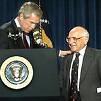Friday, November 17, 2006
Milton Friedman Taught the Left as well as Informing the Right


 I suppose I understand politics better than economics which has always confused me with its graphs with lines which intersect mysteriously(so I apologise in advance if my grasp of the subject is imperfect). However, I've always realised that economics is closely intertwined with politics and so have tried to understand it. I thought I had just about understood Keynes- for example that governments could stimulate the economy to beat recessions and manage it towards full emloyment- when along came Friedman in the sixties to offer a radical alternative. He rose to prominence during the seventies when inflation raged and government spending seemed only to stimulate more inflation rather than reduce unemployment.
I suppose I understand politics better than economics which has always confused me with its graphs with lines which intersect mysteriously(so I apologise in advance if my grasp of the subject is imperfect). However, I've always realised that economics is closely intertwined with politics and so have tried to understand it. I thought I had just about understood Keynes- for example that governments could stimulate the economy to beat recessions and manage it towards full emloyment- when along came Friedman in the sixties to offer a radical alternative. He rose to prominence during the seventies when inflation raged and government spending seemed only to stimulate more inflation rather than reduce unemployment.By advising the use of interest rates (as high as was necessary) to curb the amount of money circulating in the economy-the source of inflation according to his analysis-he was, to my left inclined seventies perceptions, causing bankruptcies and shrinking public expenditure. I was infuriated by this smug yet wholly calm and polite little Chicago economist who appeared on television in a series of programmes-I think called Free to Choose after his book- and wiped the floor with my then heroes including Dennis Healey and Neil Kinnock (I agree the latter was never in with a much of chance but I thought Healey would be). Shortly after that debate, I seem to recall, Healey began to implement a form of monetarism which squeezed the public sector, angered Labour MPs and probably cost him the leadership in November 1980.
Friedman's vision of monetary policy proved elusive for his Thatcherite disciples but his crystal clear reassertion of the idea that markets should be allowed to follow their own logic, relatively unhindered by government intervention, became orthodox not just in the Conservative Party but in the Labour opposition too, perhaps reaching its fulfillment for Labour in 1997 when Gordon Brown made the Bank of England independent. By setting interest rates at levels advised by economists and not politicians Brown has presided over a period of unprecedented economic growth. I'm not qualified to judge with any authority but I suspect Friedman-see his obituary here- must deserve at least a sliver or two of the credit.



